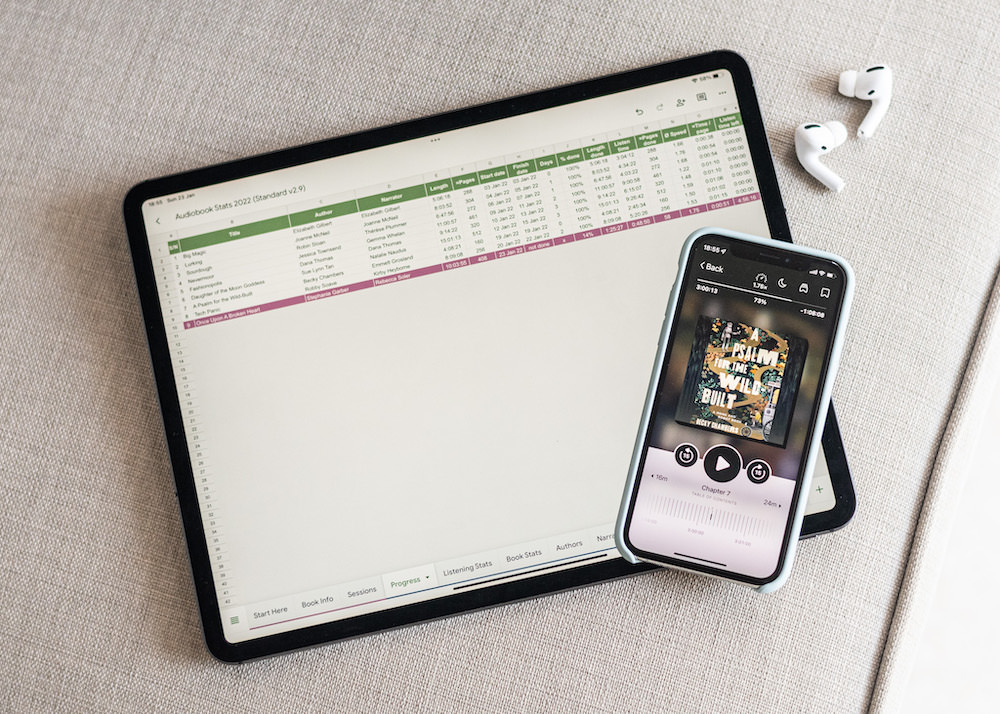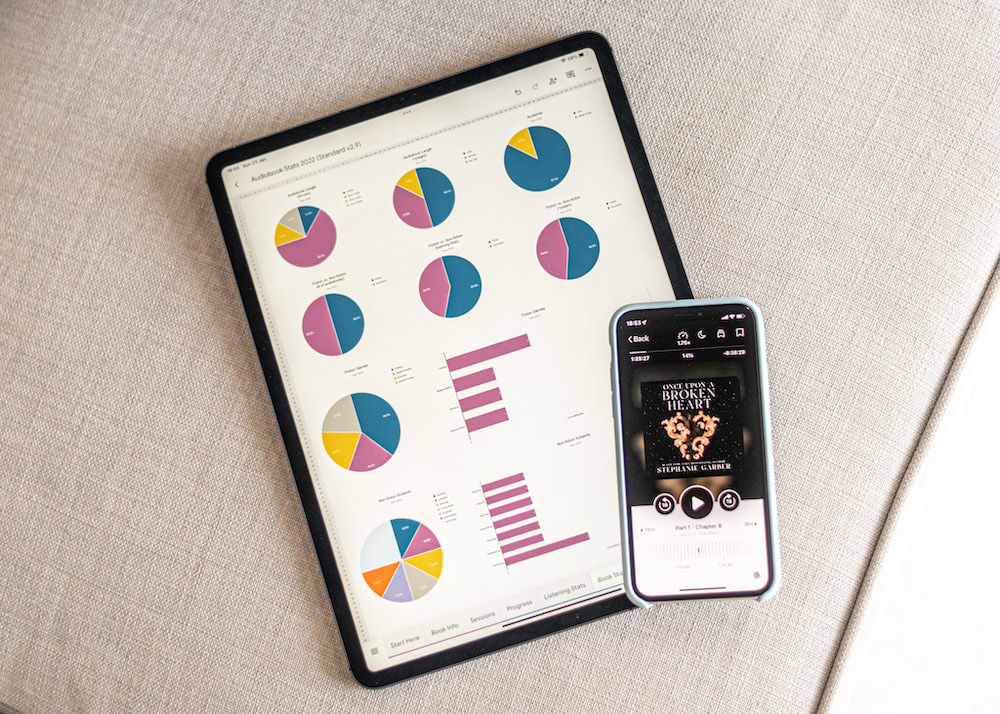![]()
What I’ve Been Working On
A couple of weeks ago, I shared a teaser of an audiobook reading tracker spreadsheet on Instagram. 28 rounds of revisions later, it’s finally ready for me to share with you!
Using this spreadsheet will allow you to see how much time you spend listening to audiobooks each day, week and month throughout the year of 2022. You can see comparisons between the recorded length of audiobooks and actual listening time. The comparisons include the page number of the print edition as well. This allows you to track how much time you spend on audiobooks while giving you a tangible idea of quantity. Since some narrators speak slower and others faster, the page number is a more consistent reference point. This is also great if you want to track audiobooks alongside other print or ebook editions that you read.

Sample daily audiobook listening chart for January 2022 so far
Why I Created This Tracker
There are a lot of ways to track the books we read, many of which I shared end of December. However, in my round-up, I noticed that to this day, there is a glaring lack of support for audiobooks.
Goodreads policy dictates that for audiobook editions, rounded up hours should take the place of page numbers. This means page number stats are always skewed for anyone who listens to audiobooks. They neither reflect the quantity read altogether nor the true number of printed/digital pages read.
Storygraph makes a clear distinction, so that duration and pagination don’t overlap but for now, their stats focus on page numbers. A few of the other social reading sites make that distinction as well but resort to percentages for tracking audiobooks. Again, audiobooks only count towards the number of books read each year but actual lengths are not taken into account.
Some audiobook providers like Audible and Audiobook.com do show stats and even gamify the experience with badges. However, they don’t consolidate the information across all the apps we listen on, and the insights aren’t always as detailed as we might like them to be.
How Does the Audiobook Tracker Work?
Log Audiobook Listening Sessions

At its core, the audiobook tracking spreadsheet consists of a book log (Book Info sheet) where you enter information about the books, such as title, author, narrator, length, etc. and a time log (Sessions sheet). In order to populate the time log sheet, I usually take screenshots when I start and finish listening to an audiobook. Then I log the time listened when I can access the Google Sheets app on my phone or iPad, or sometimes, when I’m on my computer.
See Your Progress

Based on the reading sessions logged, the Progress sheet will show the percentage done, length completed, time spent listening, and how that translates into pages of the print edition. You can also see the average listening speed if you varied it across sessions. Personally, I’m always curious because I tend to start at about 1.25x and then gradually increase the speed to a more comfortable listening pace. The last column also shows the estimated time left to listen based on the average listening speed.
Books you enter will initially stay in white cells. Rows with audiobooks that you are currently reading will be highlighted in magenta. This happens after you log your first session for each audiobook, if you don’t finish it in one sitting. Rows of books you mark as did not finish (DNF) show up in mid-grey tone with blue font. Once you’re done with an audiobook, the row colour reverts to white. This helps differentiate the various reading statuses and makes it easy to see currently reading titles at a glance.
Overview of Audiobook Stats

Stats are broken down into listening stats and bibliographical stats. The Listening Stats sheet summarises listening preferences and habits. It contains tables for monthly and quarterly stats based on daily totals and averages for (recorded) lengths done, listening time, page equivalents, audiobooks finished and average listening speed. You can even find out how the days of the week throughout the year stack up against each other.
For those who prefer visual representations, the tabular information is also distilled into listening charts below.

The Book Stats sheet shows the distribution of audiobook lengths based on recorded duration and also comparable print pagination. There’s a breakdown of audience, fiction vs. non-fiction, fiction genres and non-fiction subjects. If you’re curious if your subscriptions are worth it, you might also be interested in the breakdown of sources to see how many audiobooks you finished from each source. And of course, you can also see if the stars are in your favour with your ratings.
Lastly, the Authors and Narrators sheets collate the frequency of each person. I really like taking a look at the Narrators sheet to give me an idea of which narrators I like, and which ones I’d much rather avoid in future.
Get Your Copy of the Audiobook Reading Tracker
To use this Google Sheet template to track the audiobooks you read and listen to, you can get it here. Just make a copy and save on your own Google Drive. It’s free for personal use. Please do not redistribute. If you would like to share it with someone else, please direct them to this blog post that you are reading right now.
Ways to Support Me
You can follow me on Twitter and Instagram, share my blog with your friends and click the email subscribe button below this post. All these ways are free.
If you find the audiobook tracker useful and/or would like to help me grow Word Revel, I’d be grateful if you consider buying me a coffee. Donations will go towards web hosting and other maintenance costs of the blog, on top of actual coffee and food to fuel my creative output and content for you.

Josephine I’ve noticed that some of your posts do not have comments, may I ask why that is? I wanted to ask if all Kobo allow you to borrow from libraries without doing it through the computer? I’m in Australia though, do all Kobo have Overdrive apps natively installed upon purchase?
Josephine glad to see a fellow Filipina book blogger and reader I’m going to check out your audiobook, maybe think about creating a book tracker like Leio and Bookly. I’m not very knowledgeable in that department and struggle with spreadsheets 😂.
New follower too as I love your posts.